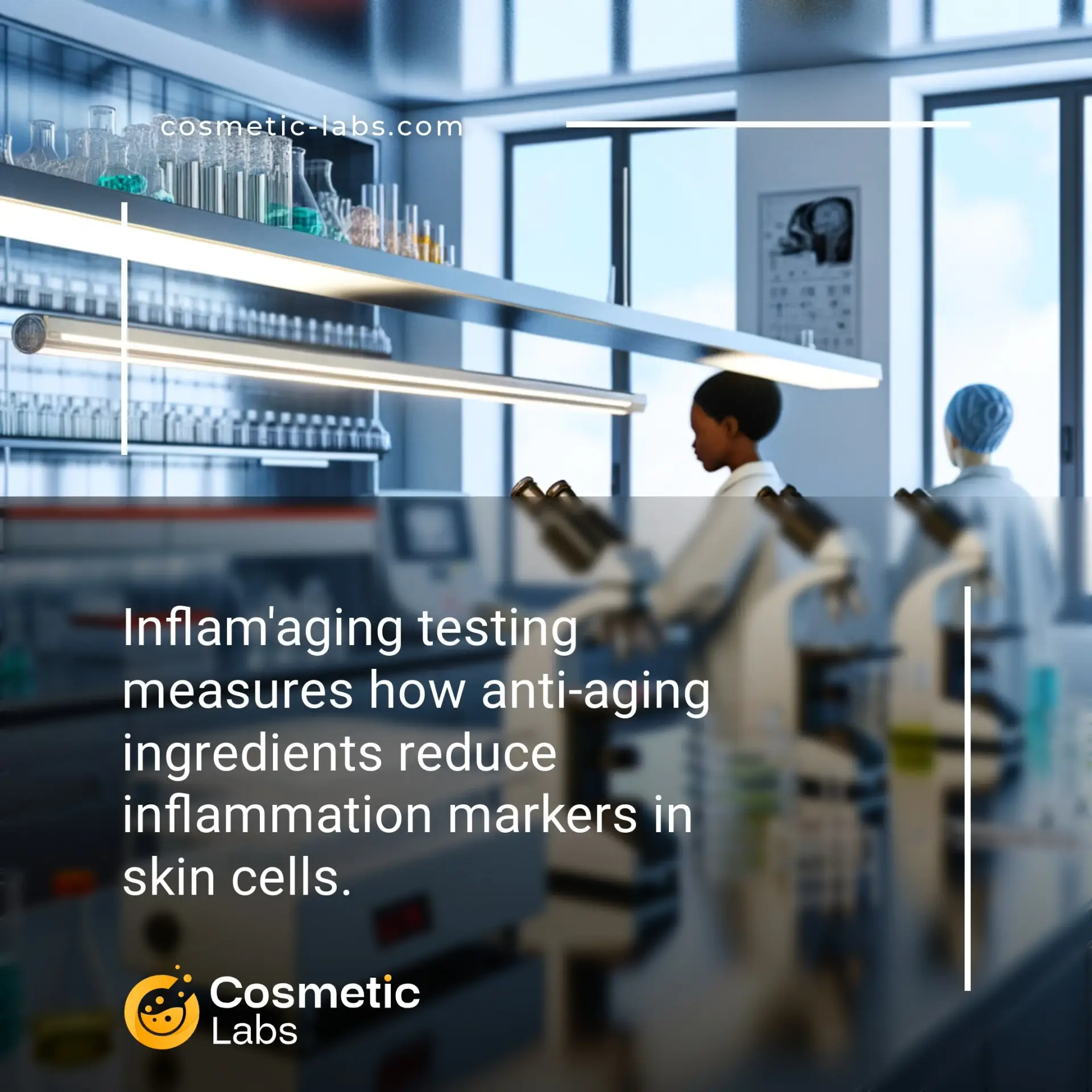Inflammaging Testing Services for Anti-Aging Products

What is Inflam'aging testing?
Inflammaging testing for anti-aging services measures how cosmetic ingredients and formulations reduce chronic low-grade inflammation that accelerates skin aging. Labs use cytokine analysis and inflammatory marker assessment to evaluate how your products calm inflammatory pathways in skin cells. This testing reveals whether your anti-aging formulation actually addresses the root inflammatory processes that cause wrinkles, loss of elasticity, and cellular damage over time.
Why do you need this service?
Cosmetic labs use inflammaging testing to validate anti-aging ingredient efficacy by measuring how formulations reduce inflammatory markers in aging skin models. Brands leverage this data to substantiate product claims about wrinkle reduction and skin barrier improvement, while securing regulatory approval for age-defying serums and creams before market launch.
Who provides Inflam'aging testing services?
All cosmetic labs providing Inflam'aging testing services
There is no company providing these services at the moment.
Inflammaging Testing for Anti-Aging Product Development
Inflammaging testing measures how cosmetic ingredients and formulations affect chronic low-grade inflammation associated with skin aging. This specialized preclinical testing helps brands validate anti-aging claims by demonstrating products’ ability to reduce inflammatory markers that accelerate cellular aging processes.
Biomarker Analysis and Inflammatory Response Testing
Labs use cell culture models to measure inflammatory cytokines like IL-1β, TNF-α, and IL-6 before and after ingredient exposure. These tests typically run 24-72 hours and provide quantitative data on anti-inflammatory efficacy. Advanced testing includes oxidative stress markers and senescence-associated proteins.
Key measurements include:
- Pro-inflammatory cytokine reduction percentages
- Antioxidant enzyme activity levels
- Cellular senescence marker expression
- DNA damage repair capacity
Skin Model Validation and Aging Simulation
3D skin models and reconstructed tissue systems simulate natural aging conditions through controlled inflammatory stress. Labs expose these models to UV radiation, pollution particles, or chemical irritants, then test how formulations protect against or reverse inflammatory damage. Results show ingredient penetration depth and cellular protection efficacy.
Testing protocols measure collagen degradation, elastin breakdown, and fibroblast activity changes. Time-course studies track inflammatory responses over 7-14 days, providing data for anti-aging product positioning and regulatory submissions.
Connect with specialized cosmetic labs on our platform to access inflammaging testing services that support your anti-aging product development and claims substantiation needs.
Practical Applications of Inflammaging Testing for Anti-Aging Services
Cosmetic labs use inflammaging testing protocols to validate anti-aging formulations by measuring chronic inflammation markers that accelerate skin aging processes.
Product Development and Formulation Validation
Labs conduct inflammaging assays during early formulation stages to screen active ingredients and optimize concentrations. Testing protocols measure inflammatory cytokines like IL-1β, TNF-α, and IL-6 in skin cell cultures treated with candidate formulations.
This approach identifies which ingredients reduce chronic inflammation while maintaining skin barrier function. Results guide formulation adjustments before moving to clinical trials, saving both time and development costs.
| Testing Phase | Inflammatory Markers | Timeline | Key Outcomes |
|---|---|---|---|
| Ingredient Screening | IL-1β, TNF-α | 2-3 weeks | Active selection |
| Formulation Testing | IL-6, NF-κB pathway | 4-6 weeks | Concentration optimization |
| Efficacy Validation | Complete cytokine panel | 8-12 weeks | Claims substantiation |
Claims Substantiation and Regulatory Support
Brands use inflammaging test data to support anti-aging claims with quantifiable inflammatory reduction metrics. Labs provide documentation showing percentage decreases in specific inflammatory markers after treatment with test formulations.
These results strengthen marketing claims about reducing visible signs of aging while meeting regulatory requirements for substantiation. The data also supports patent applications for novel anti-inflammaging formulations.
Ready to validate your anti-aging formulations with inflammaging testing? Connect with specialized cosmetic labs on our platform to discuss your specific testing requirements and timeline.
